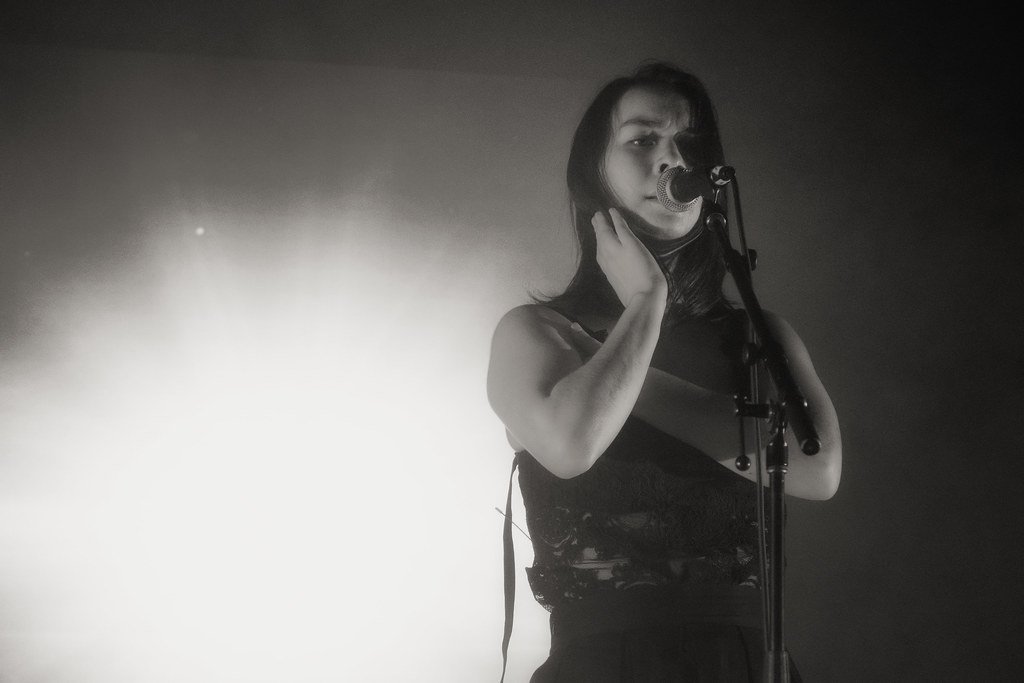Photo courtesy of David Lee via Flickr.
Released on Sept. 17, “The Land Is Inhospitable and So Are We” is Mitski’s seventh studio album.
By Sarah Berger ’27
Staff Writer
Mitksi’s music manages to encapsulate universal emotions in two or three minutes. She uses simple metaphors and beautiful music to represent things that can’t quite be captured in words, which is likely what inspires the undying devotion of her fans. Arguably, there’s not a person alive who can listen to a Mitski song and not relate in some way. Beyond simply inspiring empathy in her listeners, Mitski makes pain feel precious, longing feel divine, and happiness feel infinite.
With her seventh album, “The Land Is Inhospitable and So Are We,” released Sept. 15, Mitski shirks the adolescent emotions of her previous work for a quieter, more adult tone. Previously, her music has stayed firmly in the alternative genre, but her latest release toes into folk rock. She has called it her “most American” album.
Songs like “Buffalo Replaced,” “When Memories Snow” and “I’m Your Man” showcase her newly unveiled style. The songs conjure images of empty fields, starry skies and lonely cowboys through their solemn melodies. Although the album may be stripped down, each song feels intentional, and each note meaningful.
“The songs conjure images of empty fields, starry skies and lonely cowboys through their solemn melodies. Although the album may be stripped down, each song feels intentional, and each note meaningful. ”
Without dramatic musical shifts to engage the listener, Mitski’s lyrics must shine on their own — and shine they do. Each word feels carefully chosen. Unlike her older work, which tends to tell a cohesive narrative throughout the album, each song on “The Land is Inhospitable and So Are We” stands on its own. Each track contains a central stanza that reads like a poem, along with a chorus to supplement it. Wordless vocalizations comprise each song’s missing piece. This format is exemplified on “My Love Mine All Mine,” the breakout hit from the album and Mitski’s first entry into the Billboard Hot 100.
“The Land is Inhospitable and So Are We” stays true to the need for others’ approval present in Mitski’s earlier work, but there are some noticeable differences in how she expresses it. In “Drunk Walk Home,” from the album “Bury Me At Makeout Creek,” she sings: “You know I wore this dress for you.” Similarly, on “A Loving Feeling” from “Puberty 2,” she sings: “I’m stayin’ up later just in case / You come up and ask to leave with me.” Both of these songs are hectic; Mitski’s voice rises and falls as she begs for attention.
This theme is repeated in “I’m Your Man” from “The Land is Inhospitable and So Are We,” as she sings, “No one will ever love me like you again / So, when you leave me, I should die / I deserve it, don’t I?” Although the lyrics are melancholy on the surface, there’s a hint of irony as she sings them: a wink at the audience. There’s no screaming. She’s self-aware in her wallowing, laughing at anyone who would actually dare to perceive her that way. In the very next song, “I Love Me After You,” she leaves this theme behind, writing, “Streets are mine, the night is mine / All my own / How I love me after you.”
Though Mitski delves into her own greed, desire, loneliness and hopefulness, the album itself is not saddening. It feels like the result of several long meditation sessions, with the quiet conclusion that running from your problems won’t get you anywhere — at least not anywhere you’d like to be. It is a measured response to universal emotions and an exploration of living with oneself.
“The Land is Inhospitable and So Are We” is less musically distinct than Mitski’s past works. If you aren’t careful, the entire album can pass by without a particular song standing out, leaving you wondering where your forty minutes have gone. Ultimately, you get out of the album what you put into it.
This album is not meant for studying or singing along in the car. It is not a soundtrack to the mundane, as universal as its topics are. It’s for quiet moments, for time alone at the end of the day. Mitski is speaking, not yelling. She doesn’t need anyone to listen.

